
USA: Neuralink has announced that its first human trial may not be far away, 19 months after implanting a brain-computer interface (BCI) chip inside a monkey's brain.
The company's CEO Elon Musk predicted that the first human test would take place in "about six months" at its most recent "show and tell" event. Since it launched, Neuralink has experienced three similar incidents.
Musk's entry into the field of brain-computer interface technology has changed this permanently. There has been a boom in start-ups and investors in the industry.
Also Read: Supermassive black hole brutally destroys a star and unleashes an incredibly bright jet
Musk's Neuralink hasn't made much progress, except for a few experiments on pigs and monkeys. However, it is an important announcement that it is getting closer to human trials. It remains to be seen how it works in people.
Neuralink wants to develop a system that can be implanted in the brain and uses brain activity to control a computer. According to Musk at the event, the coin-sized brain implant should be ready for human testing within six months. Musk further said that the company is attempting to gain FDA approval for human clinical trials.
Musk previously referred to Neuralink's technology as a "Fitbit in your skull". The system uses up to 1,024, 5-micron diameter threads stitched into the brain's gray matter to connect with nearby neurons.
The device converts neuronal spikes into data that a computer can understand. Additionally, the business has a robot that removes a piece of the skull and inserts the chip.
Also Read: Apple Releases iOS 16.1.2 Update; Improves Crash Detection on iPhone 14 Series
Neuralink chips have been implanted in the brains of pigs and monkeys. To demonstrate the safety of the procedure and the long duration of implantation in the brain, the device has been tested on primates. Last year, it featured a monkey playing ping pong. This year, a monkey used the implant to telepathically type "Welcome to Show and Tell".
The main purpose of BCIs is to enable thought-based communication in people with disabling conditions such as amyotrophic lateral sclerosis (ALS) or after-effects related to stroke. This was illustrated by the "telepathic" monkey at this year's presentation. But in typical Elon Musk fashion, the business is already looking at placing the implant in other areas of the body.
Along with BCI, Musk discussed two additional Neuralink products during the event. There is an implant that can be inserted into the spinal cord and can help someone who is paralyzed to move.
There is a transplant option for the eyes. People with vision impairment may be able to improve or regain their vision with the help of this ocular implant.
Musk has always believed that some sort of computer enhancement is necessary for humans to stand up against artificial intelligence.
You're really used to being a cyborg, he said during the event. But if you are talking on your phone then you are constrained, he continued. He said, "You know, a computer can communicate at gigabits, terabits per second.
Also Read: Tencent's League of Legends spin-off wins an Apple award
Musk has been criticized for exaggerating the technology's capabilities and over-promising. Seeing a monkey type 'telepathically' is not a new thing.
The company's "Thought to Data" technology is already available. While Onward Inc. has made some significant progress with people with spinal cord injuries, Synchron Inc. Has helped people who are unable to speak or communicate wirelessly through computers.